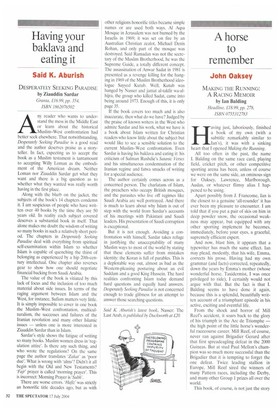Having your baklava and eating it
Said K. Aburish
DESPERATELY SEEKING PARADISE by Ziauddin Sardar Granta, £16.99, pp. 354, ISBN 1862076502
Any reader who wants to understand the mess in the Middle East or learn about the historical Muslim-West confrontation had better seek elsewhere. That notwithstanding, Desperately Seeking Paradise is a good read and the author deserves praise as a storyteller. In fact, expecting us to accept the book as a Muslim testament is tantamount to accepting Willy Loman as the embodiment of the American dream. Neither Loman nor Ziauddin Sardar get what they want and there is a big question as to whether what they wanted was really worth having in the first place. Along with the blurb on the jacket, the subjects of the book's 14 chapters condemn it. I am suspicious of people who have written over 40 books by the time they are 50 years old. In reality each subject covered deserves a substantial book in itself. That alone makes me doubt the wisdom of writing so many books in such a relatively short period. The chapters in Desperately Seeking Paradise deal with everything from spiritual self-examination within Islam to whether Islam is capable of quenching the thirst of belonging as experienced by a hip 20th-century intellectual. One chapter also reverses gear to show how one should negotiate financial backing from Saudi Arabia.
The value of the book is vitiated by this lack of focus and the inclusion of too much material about side issues. In terms of the raging argument between Islam and the West, for instance, Sufism matters very little. It is simply impossible to cover in one book the Muslim-West confrontation, multiculturalism, the successes and failures of the Iranian revolution and many other Islamic issues — unless one is more interested in Ziauddin Sardar than in Islam.
Sardar's style shows the fatigue of writing so many books. Muslim women dress in 'regulation attire'. Is there any such thing, and who wrote the regulations? On the same page the author translates `Zalcat' as 'poor due'. What is wrong with 'alms'? Didn't it all begin with the Old and New Testaments? 'Fay prayer is called 'morning prayer'. This is incorrect: Morning Prayer is `Subh'. There are worse errors. ' Hafiz' was strictly an honorific title decades ago, but as with
other religions honorific titles became simple names or are used both ways. Al Aqsa Mosque in Jerusalem was not burned by the Israelis in 1969; it was set on fire by an Australian Christian zealot, Michael Denis Rohan, and only part of the mosque was destroyed. Said Ramadan was not the secretary of the Muslim Brotherhood, he was the Supreme Guide, a totally different concept. The assassination of Anwar Sadat in 1981 is presented as a revenge killing for the hanging in 1969 of the Muslim Brotherhood ideologue Sayyed Kutub. Well, Kutub was hanged by Nasser and jamat al-takfir wa-alhijra, the group who killed Sadat, came into being around 1973. Enough of this, it is only page 35.
If the book covers too much and is also inaccurate, then what do we have? Judged by the praise of known writers in the West who admire Sardar and his work, what we have is a book about Islam written for Christian readers who know little about the subject but would like to see a sensible solution to the current Muslim-West confrontation. Even Sardar is having his baklava and eating it: his criticism of Salman Rushdie's Satanic Verses and his simultaneous condemnation of the Iranian regime and fatwa smacks of writing for a special audience.
The author certainly comes across as a concerned person. The charlatans of Islam, the preachers who occupy British mosques, and the parasites who live off regimes like Saudi Arabia are well portrayed. And there is much to learn about why Islam is out of step with the world from Sardar's accounts of his meetings with Pakistani and Saudi leaders. His presentation of Saudi corruption is exceptional.
But it is not enough. Avoiding a confrontation with himself, Sardar takes refuge in justifying the unacceptability of many Muslim ways to most of the world by stating that these elements suffer from mistaken identity: the Koran is full of parables. This is a deplorable way out, almost as bad as the Western-pleasing posturing about an evil Saddam and a good King Hussein. The hard realities confronting Islam today demand hard questions and equally hard answers. Desperately Seeking Paradise is not concerned enough to trade glibness for an attempt to answer those searching questions.
Said K Abutish's latest book, Nasser: The Last Arab, is published by Duckworth at £20.


























































 Previous page
Previous page